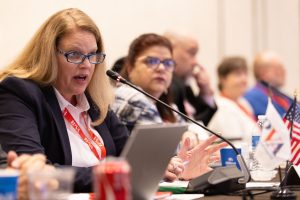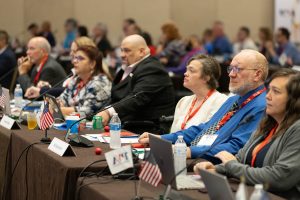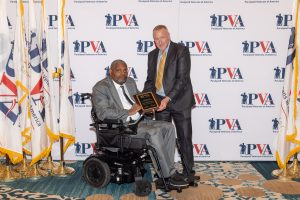PVA convention offers learning opportunity for national directors
While the May 12-17 79th Annual Paralyzed Veterans of America (PVA) Convention at the Hilton Austin in Austin, Texas, was about improving the national organization as a whole, it was also an opportunity for both new and seasoned national directors to exchange ideas to take back to their chapters.
Marine Corps veteran Amy Patterson, a new national director from the PVA Central Florida Chapter, says the convention was a time for her to learn her role in PVA, as the past year and a half has been a whirlwind.

The 55-year-old Palm Bay, Fla., resident served from 1989 to 1998 and sustained her initial level L1-L5 spinal cord injury in a 1997 rollover Humvee training accident, but she is now considered a level C5-C6 quadriplegic. She’d been a PVA member for several years before attending her first PVA Women Veterans Empowerment Retreat in 2023 in Orlando, Fla. Within a few months, she was asked to join the chapter’s board, government relations department and the Anita Bloom Women Veterans Committee. She’s been the chapter’s national director for just two months.
“I have an idea of what I’m supposed to do, but I’m just hoping this convention brings more clarity to the role that I’ll provide within the national organization, so that I can hopefully affect change not only at the national level, but at the chapter level, and especially in [Washington] D.C., which is where my main motivation is, is to get legislation passed and codified to ensure that catastrophically disabled veterans have care and the benefits that we fought for, that we were promised,” Patterson says.
Patterson says the current political climate is the most critical issue facing PVA.
“The threat to the benefits and the contract that every veteran in this country signed, not just PVA. We signed a contract to give up to and include our lives … when you break ties with the military, your fight’s not over. You then have to fight the VA [Department of Veterans Affairs] for years and years for your benefits,” she says. “So, I think the things that veterans are promised when they sign on the dotted line willingly is absolutely under threat right now.”
Patterson says seeing other strong women who have served and are willing to step up made her want to get more involved in PVA and show that women are also the face of the organization. She raised her hand several times to ask questions during the convention.
“I absolutely feel like I’ve found a voice and a place here in PVA that I believe no other veterans organization would have afforded me,” Patterson says. “I was prepared for this convention that, ‘Hey, you won’t have to speak. You won’t have to say anything.’ But if I’ve got something to say, I believe in establishing myself. I mean, I may be new, but I have a place in this organization, and I need to make sure that our voices get heard, that my voice gets heard. Hopefully, what I have to say makes somebody else think that, ‘OK, this is not just important to me, but it’s important for the organization.’”
Meanwhile, Army veteran Scott Griffith, the national director for the PVA Wisconsin Chapter, has been to at least four conventions and says he enjoys the camaraderie and learning what other chapters are doing.
“I appreciate the unique perspectives that the national directors collectively bring to the national board of directors,” the 58-year-old Menomonee Falls, Wis., resident says. “Obviously, we all have different backgrounds and different things that we’re passionate about, and I think that brings value to the collective board itself.”

Griffith, who served from 1984 to 2010 and is an eighth-generation combat veteran, has a level C2 incomplete SCI from a cancerous tumor inside his spinal cord. He says it’s important for all the chapters to work together and follow the national guidance.
“I’m a strong advocate for transparency in everything we do, both at the chapter level and at the national level,” Griffith says. “And I think the margins just need to be tightened up a little bit in our policies and procedures to ensure that everyone has the same level of transparency in reporting.”
Griffith encourages any PVA member to volunteer and run for a leadership or national director position within his or her chapter.
“It’s a great opportunity for any PVA member to get more involved and get a better understanding of the chapter role within the national footprint, how they work together and the bigger, broader things that PVA national does for our entire membership,” Griffith says.
For more information on the convention, read the feature article in the July issue of PN.

